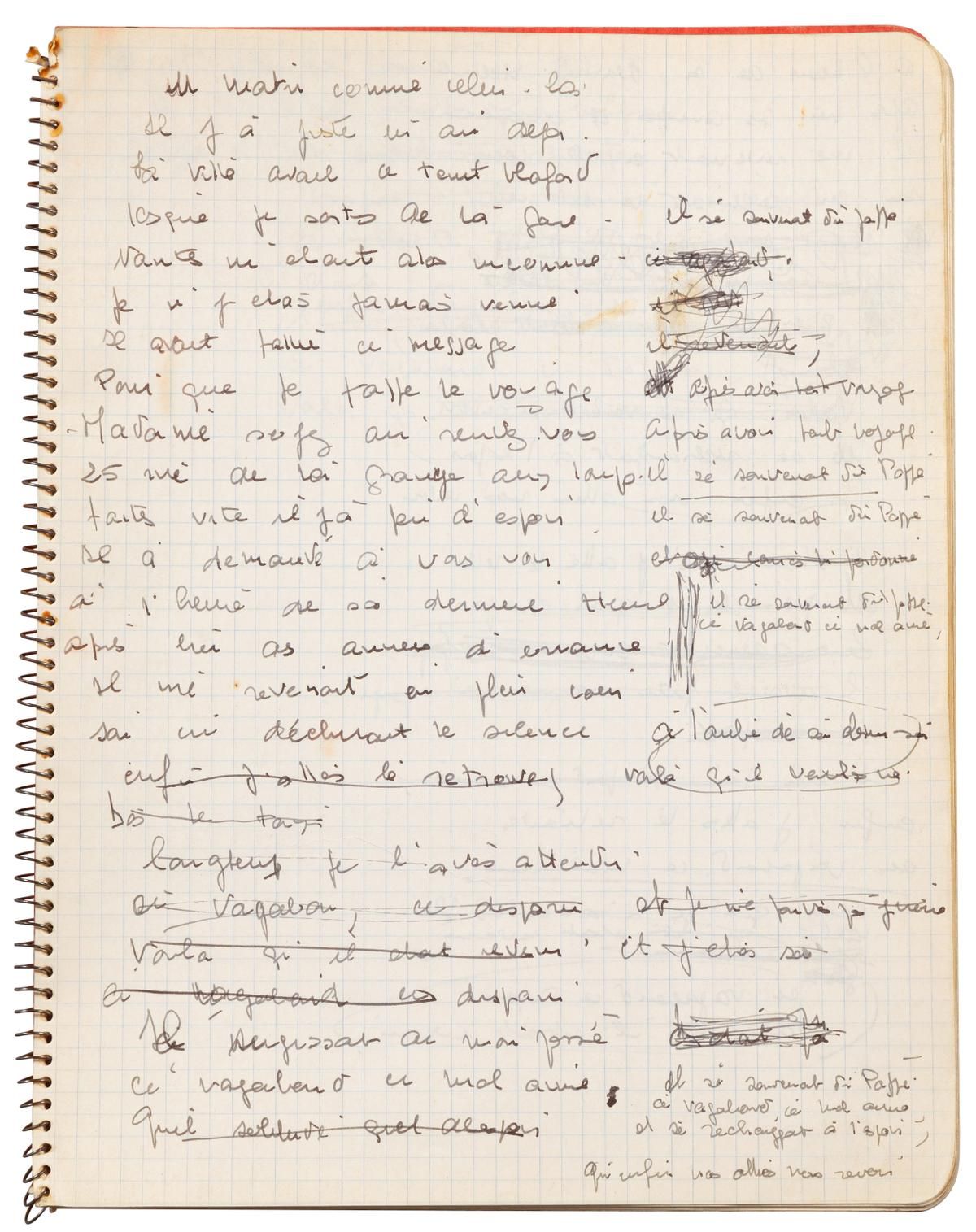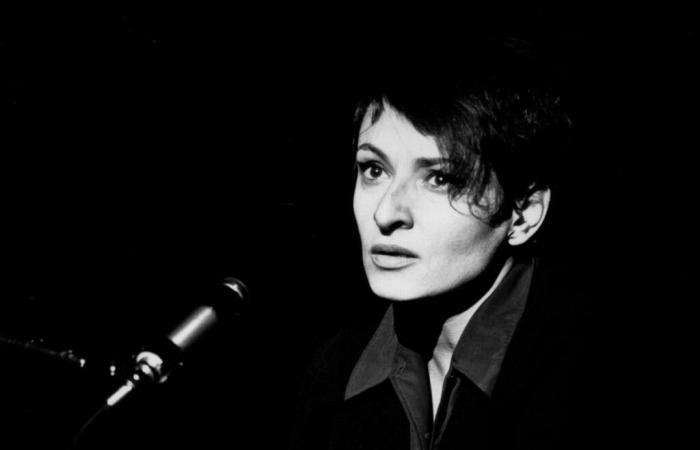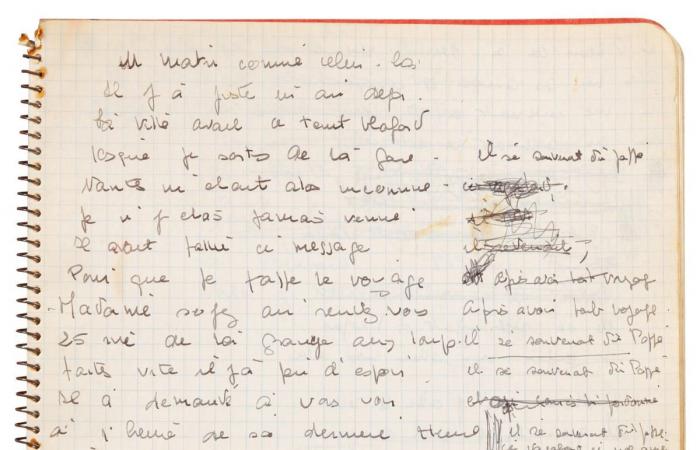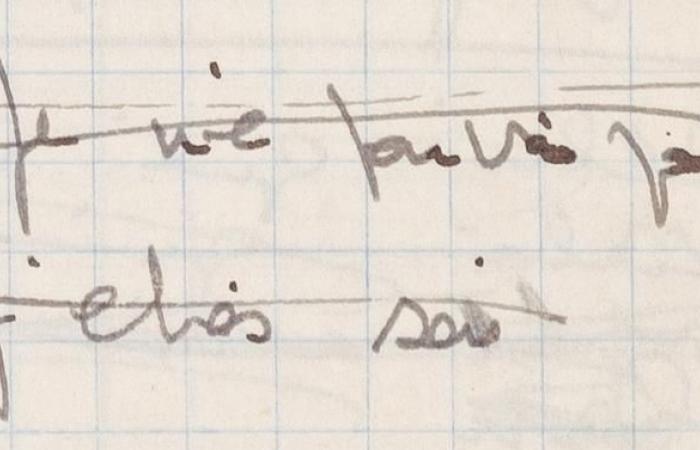A lot of the singer's manuscripts are up for auction at Sotheby's this Wednesday, December 18. Among them: numerous drafts where Barbara, a victim of incest during her childhood, evokes the painful relationship with her father.
Barbara to her father, in her posthumous memoirs published in 1998: “I forgive you, you can sleep peacefully. I got away with it because I sing! » Photo Reg Lancaster/Express/Getty Images
By Valérie Lehoux
Published on December 16, 2024 at 5:00 p.m.
PAmong Barbara's manuscripts offered for auction at Sotheby's, this Wednesday, December 18, collectors will find small words scribbled on notebooks, taken from a romantic correspondence; and the more or less accomplished texts of around ten songs – The Brown Lady, Solitude, The Bel Age… But these are the drafts of just one, Nantes, which will attract the attention of exegetes. Because more than sixty years after the creation of this centerpiece of the work, the manuscripts, never yet exhibited to the public, support a testimony. That of Sophie Makhno, which we collected in 2005: “ I don't know if anyone has found all the drafts of Nantesbut it has blackened I don't know how many leaves! She was in her bubble, you had to see her… She seemed isolated. And she crossed out, she crossed out. Nantesit was a horribly difficult song to finish. She rewrote it compulsively. »
At the time, in November 1963, Sophie Makhno was responsible for presenting an evening at the Théâtre des Capucines, in Paris, as part of a series of concerts dedicated to young talents in “text” song. Barbara, whose notoriety remained confined to cabarets, was invited there. A few hours later, in front of a stunned audience, she was going to create Nantes, on the death of his father. Nantes, with a tone of confidence both simple and heartbreaking which broke with the literary aesthetic then in vogue on the left bank, has since become a classic of the French-speaking repertoire. However, the history and underlying drama were ignored for a very long time.
The Portrait of a Broken Man
What for years was taken for a song of mourning was also that of a crime and a pain never extinguished: incest, which Barbara suffered for several years at the hands of her father – who left the family home in 1949, when she was 19, to not give any more news -, and the forgiveness, which she did not have time to grant him, when he died, in Nantes, ten years later. All things that she did not tell publicly during her lifetime, but which were finally revealed in her posthumous Memoirs (There was a black piano… Interrupted memories, Fayard, 1998). “I forget all the harm he did to me, Barbara then wrote, and my greatest despair will be not having been able to say to this father whom I hated so much: “I forgive you, you can sleep peacefully. I got through it because I sing!” »
Also read:
“Lily Passion”, Barbara’s masterpiece that no one can see
Are the drafts on sale today at Sotheby's those that the singer had blackened in front of Sophie Makhno in November 1963? It is impossible to establish it with certainty (they belong to a man who only met Barbara the following year, but nothing says that he had not then recovered older documents). Whatever the case, they attest to the essential: in fact, Barbara will have written and rewritten Nantes, many times, visibly hesitating about what she was going to deliver from the story.


One of the many handwritten drafts of “Nantes”. Photo FloianPerlot/ArtDigitalStudio/Sotheby’s
Among the lot of manuscripts put up for auction, one notebook is even almost entirely devoted to this single song. Passages are crossed out, others were never sung, probably because they too openly suggested the suffering of relationships and silence. In any case, she paints the portrait of a broken man, towards whom she shows no anger. It reads as follows: “I had dreamed without really believing it / That he would try to see me again. » Or again: “I will never be able to know / What solitude, what despair / Had thrown him like a wreck / To Nantes to be shipwreck. » Unpublished verses, which resonate with this question from the Memoirs: “perhaps he carried around the memory and remorse of his crime for a long time and everywhere? » Above all, on two occasions, we very clearly see the theme of forgiveness. (“He remembered the past […] / And already I had forgiven”), forgiveness that she affirms in her Memoirs.
Also read:
Anna Mouglalis reads Barbara on stage: “She transformed her vulnerability into strength”
Finally, a sentence, crossed out, calls out. It turns out to be more difficult to decipher and therefore requires caution, but it is possible that it says: “and I couldn’t heal”… Now we know with near certainty that Barbara, throughout her career and in a more or less coded manner, alluded to the drama of her childhood in several songs (In the heart of the night, The Black Eagle, or the show Lily passion). Like a wound that never heals.


Photo FloianPerlot/ArtDigitalStudio/Sotheby’s
The evening at the Théâtre des Capucines, when she sang Nantes for the first time (in a slightly different version from the one she later recorded on disk), important professionals were in the room. Like Louis Hazan, director of Philips, or Denise Glaser, the producer of Discorama. Everyone said they were in shock at the intensity of the song. Shortly after, she would record her first singer-songwriter album, Barbara sings Barbara (also known as the Rose Album), which would earn him the Grand Prix of the Charles Cros Academy. Then in the fall of 1964, she would explode as the opening act for Brassens in Bobino. And would return there the following year, at the top of the bill this time.









